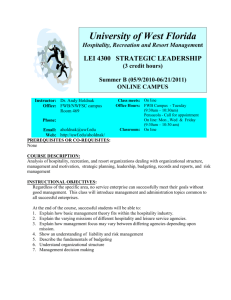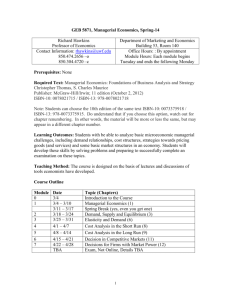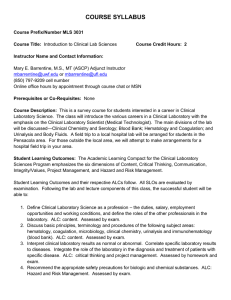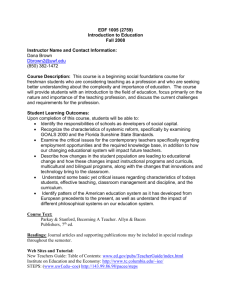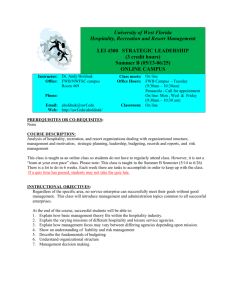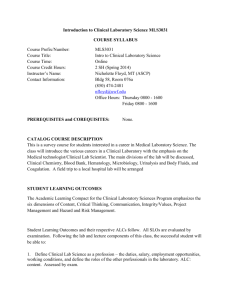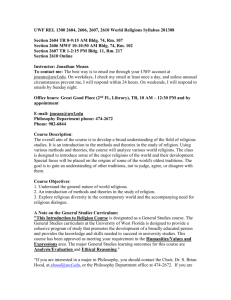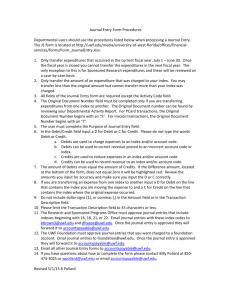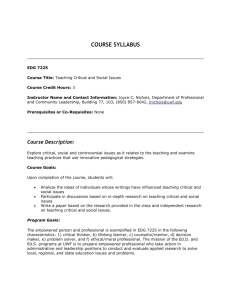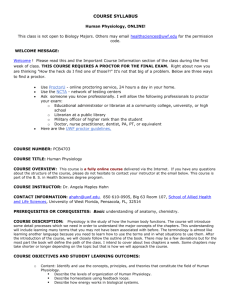GEB 5871 Economics (Online) Fall 2007, Term E (Section 2239
advertisement
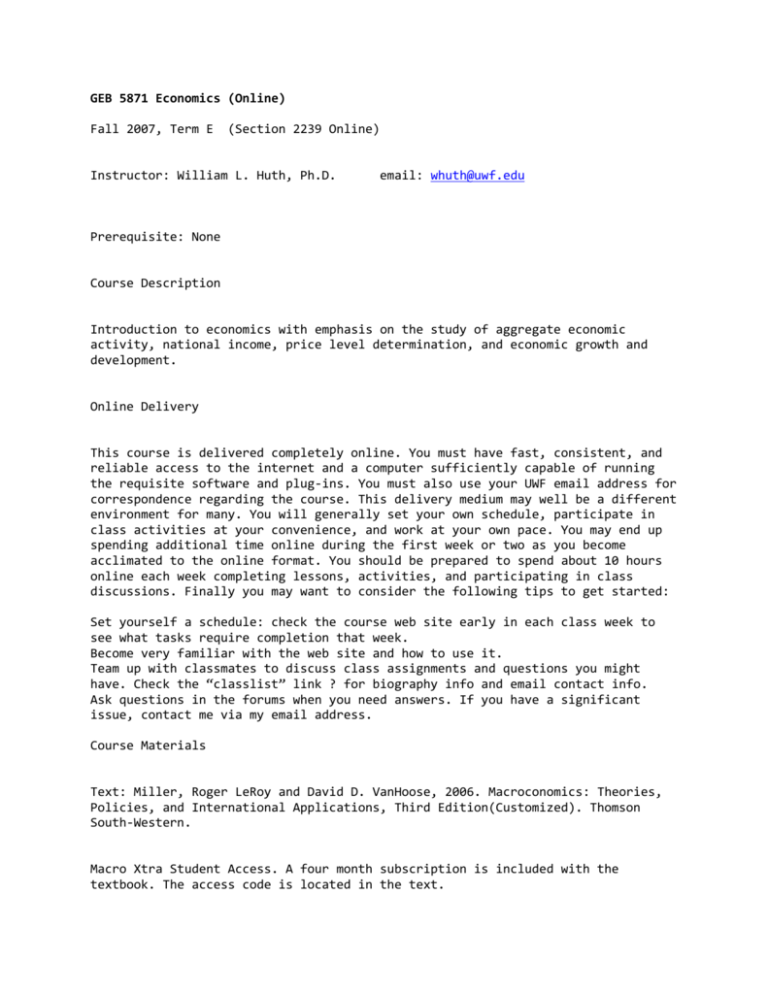
GEB 5871 Economics (Online) Fall 2007, Term E (Section 2239 Online) Instructor: William L. Huth, Ph.D. email: whuth@uwf.edu Prerequisite: None Course Description Introduction to economics with emphasis on the study of aggregate economic activity, national income, price level determination, and economic growth and development. Online Delivery This course is delivered completely online. You must have fast, consistent, and reliable access to the internet and a computer sufficiently capable of running the requisite software and plug-ins. You must also use your UWF email address for correspondence regarding the course. This delivery medium may well be a different environment for many. You will generally set your own schedule, participate in class activities at your convenience, and work at your own pace. You may end up spending additional time online during the first week or two as you become acclimated to the online format. You should be prepared to spend about 10 hours online each week completing lessons, activities, and participating in class discussions. Finally you may want to consider the following tips to get started: Set yourself a schedule: check the course web site early in each class week to see what tasks require completion that week. Become very familiar with the web site and how to use it. Team up with classmates to discuss class assignments and questions you might have. Check the “classlist” link ? for biography info and email contact info. Ask questions in the forums when you need answers. If you have a significant issue, contact me via my email address. Course Materials Text: Miller, Roger LeRoy and David D. VanHoose, 2006. Macroconomics: Theories, Policies, and International Applications, Third Edition(Customized). Thomson South-Western. Macro Xtra Student Access. A four month subscription is included with the textbook. The access code is located in the text. Other Materials Additional materials will be available from the course site or from various internet sources. Special Technology Requirements This course is totally online so that all instructional content and interaction will take place over the internet. You should have regular and reliable access to the internet via a fast connection. Your computer should run the Microsoft Windows 2000 or Windows XP operating system (while Vista might work there are no guarantees that it will). For documents use either Microsoft Word (Note that Microsoft Office 2007 formats are not supported so that if you are using Office 2007 applications you should save using document formats for an earlier version). In addition to fundamental word processing and spreadsheet skills, you should be able to send and receive emails with attachments and you should be able to upload files to and download files from the internet. You should also have the following: Browser: Internet Explorer (version 6.0 or above), Netscape (version 7.1 or 7.2) Adobe Acrobat Reader: http://www.adobe.com/products/acrobat/readstep2.html Power Point Viewer: http://microsoft.com/downloads/details.aspx?FamilyId=D1649C22-B51F-4910-93FC4CF2832D3342&displaylang=en Windows Media Player: http://www.microsoft.com/windows/windowsmedia/download/ Quicktime Player: http://www.apple.com/quicktime/download/ Macromedia Flash Player: http://macromedia.com/shockwave/download/download.cgi?P1 Prod Version=ShockwaveFlash Course Requirements and Grading Your course grade will be based three components: required homework quizzes, weekly essays, and a paper. You will be required to complete a weekly module homework quizzes. You will also be required to develop a macroeconomic research paper. Finally you are expected to develop a weekly essay on an economic topic from the assigned material, the topics are in the weekly module assignment document. You may also participate in discussions with your classmates on the elearning discussion forums for extra credit. Each course component will accumulate points and your grade will be determined on the percent of total points that you are able to accumulate. The point distribution is as follows: Homework Quizzes (40 points), Essays (40 points), and Paper (20 points). Homework quizzes and essays combine equally to determine 80% of your grade and the paper contributes the other 20%. Five points of extra credit from participation in class discussion forums are possible. Your final grade will be determined on a percent of total points basis and recorded as outstanding (A), above average (B) , average (C), below average (D), or failure (F) with an appropriate letter and a minus or plus. Dropping/Adding/Withdrawing I am not responsible for dropping enrolled students. Students wishing to withdraw are obligated to officially withdraw even though they may have not attended any classes. Students who fail to officially withdraw are subject to a failing grade in the course. The deadline for dropping a course without a penalty is published by the University. Incompletes A grade of incomplete will be given only under extreme extraordinary circumstances and will be considered only when 75 percent or more of the course requirements have been satisfactorily met. Course Requirement Information: Homework will be assigned and completed using the UWF eLearning web site and the Thomson South-Western Macro Xtra web site. The assignments will be available for completion starting at 1pm on the Friday prior to the first day of each Module/Week and will close at 11:59pm cst on the Sunday of that Module/Week. Homework quizzes are not time limited and intended to be taken individually and your results must be delivered to my email address by the Sunday evening deadline. The paper dropbox will be open until 11:59pm cst the last day of class. The weekly essay dropbox will also close with the module each Sunday at 11:59pm. Course Goals, Objectives, and Learning Outcomes An overall goal for this course is to provide you with the opportunity to acquire the knowledge and skills needed to study and understand the workings of an economy. The topics outlined above will provide the basic tools necessary to develop economic models that describe how the United States macro economy operates so that you can understand the policy issues that face the nation. In order to meet this goal, by the end of the course you will be able to do the following (in other words, you should expect these core learning outcomes if you meet the expectations for satisfactory engagement with and involvement in the course): (a) You will be able to comprehend, explain, and discuss basic macroeconomic concepts and theory. (b) You will be able to apply macroeconomic reasoning in the examination of problems facing decision makers in both business and the formation of public policy. (c) You will be able to interpret basic macroeconomic data and information within the context of aggregate demand and supply concepts and theory to expand your understanding and knowledge of economic systems. (d) You will be able to apply your knowledge of the macro economy economic to explain the formation of basic business and economic plans and strategies. (e) You will be able to explain how and why the federal government intervenes in the economy to maintain full employment, growth, and stable prices. Basically, at the end of the course, you should be able to read newspaper articles about or watch news coverage of the current economic state be comfortable in understanding the issues raised (eg. The principal causes of the economy’s current state), anticipated changes (eg. interest rates), and expected impacts. Schedule (See Schedule Document) Please note that I reserve the right to alter the above requirements to adapt to changing circumstances in order to achieve optimal student learning. University Required Syllabus Content Special Needs Assistance Students with special needs who require specific examination-related or other course-related accommodations should contact Barbara Fitzpatrick, Director of Student Disability Resource Center, SDRC@UWF.edu, (850) 474-2387. Student Disability Resource Center will provide the student with a letter for the instructor that will specify any recommended accommodations. Academic Conduct Policy Expectations for Academic Conduct/Plagiarism Policy As members of the University of West Florida, we commit ourselves to honesty. As we strive for excellence in performance, integrity – both personal and institutional – is our most precious asset. Honesty in our academic work is vital, and we will not knowingly act in ways to erode that integrity. Accordingly, we pledge not to cheat, nor to tolerate cheating, nor to plagiarize the work of others. We pledge to share community resources in ways that are responsible and that comply with established policies of fairness. Cooperation and competition are means to high achievement and are encouraged. Indeed, cooperation is expected unless our directive is to individual performance. We will compete constructively and professionally for the purpose of stimulating high performance standards. Finally, we accept adherence to this set of expectations for academic conduct as a condition of membership in the UWF academic community. The Student Code of Conduct sets forth the rules, regulations and expected behavior of students enrolled at the University of West Florida. Violations of any rules, regulations, or behavioral expectations may result in a charge of violating the Student Code of Conduct. It is the student’s responsibility to read the Student Code of Conduct and conduct themselves accordingly. You may access the current Student Code of Conduct at http://www.uwf.edu/judicialaffairs. Links: Academic Conduct Policy: http://uwf.edu/academic/policies/acadpol/acpolicy.htm Plagiarism Policy: http://uwf.edu/cas/aasr/Plagiarism.pdf Student Handbook: http://www.uwf.edu/uwfmain/stuHandbk/

